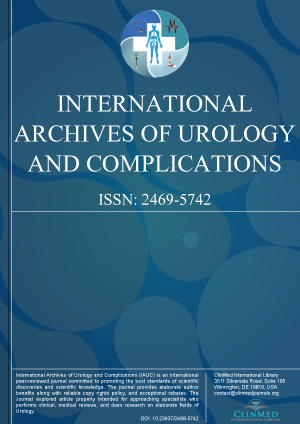Open Access DOI:10.23937/2469-5742/1510073
Primary Melanoma of the Bladder at Puerperium: Case Report
Rubio Galisteo JM, Gomez Gomez E, Valero Rosa J, Salguero Segura J, Pineda Reyes B, Gonzalez T, Barbudo Merino J, Ruiz Garcia JM and Requena Tapia MJ
Article Type: Case Report | First Published: June 19, 2020
Primary malignant melanoma of the urinary bladder is a sporadic disease and very little described in the literature. A 39-years-old female at the end of her pregnancy without previous history of skin disease was presented with hematuria after cesarean and with constitutional syndrome. After the study, the patient was diagnosed with metastatic bladder melanoma. Other locations of primary injury were ruled out. The patient died a month and a half after the diagnosis....
Open Access DOI:10.23937/2469-5742/1510072
Chinese Traditional Cupping Therapy to Treat Fat Liquefaction at SNM Surgery - Case Report
Linxi Yang, Weilin Fang, Ying Wu and Jiayi Li
Article Type: Case Report | First Published: May 27, 2020
Sacral neuromodulation (SNM) is a minimally invasive technique to modulate spinal reflexes that influence the bladder, bowel, sphincter, and pelvic floor to improve and restore voiding and storage functions. It includes two phases of surgery and patients with symptomatic relief during stage I are permanently implanted with a sacral pulse generator. The most common adverse events are change in stimulation, implant site pain, and infection. However, there are no reports of fat liquefaction at the ...
Open Access DOI:10.23937/2469-5742/1510071
Complications of Laparoscopic Versus Open Nephrectomy for Xanthogranulomatous Pyelonephritis: A Contemporary Series
Neel Raval, Justin Benabdallah, Leslie Selden L, Joel Vetter, Ramakrishna Venkatesh R and Robert S Figenshau
Article Type: Research Article | First Published: April 15, 2020
Xanthogranulomatous pyelonephritis (XGP) has historically been managed with open nephrectomy. In the era of minimally invasive surgery, a small number of reports have evaluated the use of a laparoscopic approach in XGP, with variable results. We evaluated the complications of nephrectomy for XGP over the last 18 years. This represents one of the largest series to date comparing laparoscopic and open nephrectomy for XGP....
Open Access DOI:10.23937/2469-5742/1510069
Radical Prostatectomy versus External Beam Radiotherapy - Indication and the Way to the Decision: A Cumulative Non- Interventional Unicentric Retrospective Trial of about 20 Years
Wolf-Diether U Boehm, Rainer Koch, Michael Froehner, Stefanie Wenzel, Carmen Werner, Alexander Mehnert and Manfred P Wirth
Article Type: Original Article | First Published: April 06, 2020
From the clinical reality of a private consultation, a non-interventional, parallel, two-armed, non-randomized study was started in close cooperation with the Regional Clinical Cancer Register Dresden for the period 1996-2016, in order to objectively define the allocation algorithms for the primary therapy decision RPE vs. ERBT retrospectively in the curative setting for clinically, localized to locally advanced tumor. Furthermore, the implications of this decision on the result should be review...

